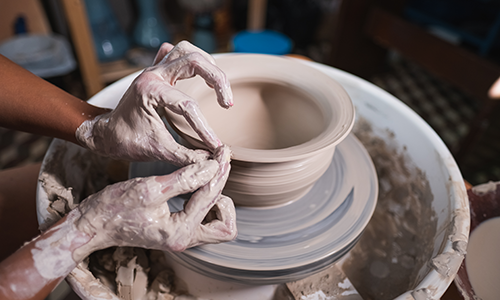Productive Disruption: A Year of Tests and Trials in Our Legal System
 Last summer, I joined IAALS on an interim basis to lead the institute and to chair a national search for my successor. My interim role will end soon. With the help of Heidrick & Struggles, we recruited an exceptional leader, David Yellen. David and I are transitioning ahead of his June 1 start, and I am more excited than ever for IAALS’ future!
Last summer, I joined IAALS on an interim basis to lead the institute and to chair a national search for my successor. My interim role will end soon. With the help of Heidrick & Struggles, we recruited an exceptional leader, David Yellen. David and I are transitioning ahead of his June 1 start, and I am more excited than ever for IAALS’ future!
To the uncommonly talented IAALS team, thank you for welcoming me while balancing life, work, and grief over the impacts of COVID-19 on friends, family, and ourselves. I have appreciated my colleagues’ virtual grace. In what weird alternate universe would I have imagined leading a team without ever once meeting my teammates in one place?
Our new virtual reality has been especially challenging because, like the rest of America, we have processed three wrenching national experiences with each over Zoom, rather than face to face. We have imagined the experiences as tests. Because IAALS aspires to advance the American legal system, we have sought to answer these tests together and for the sake of our shared mission.
The first test has been COVID-19. While horrific, the pandemic has demanded improvisation within the American legal system. Until the last 12 months, three aspects of the system seemed cast in stone: court hearings almost always must be in person; attorney education, licensure, hiring, and promotion—and the way in which legal advice is sought and provided—can only be changed incrementally, if at all; and meaningful dialogue about the American legal system can only be achieved in person. Yet the last year has presaged large-scale changes in all three. This is a time of productive disruption.
IAALS thrives during change because we are natural experimenters. We imagine access to justice in the broadest possible terms for people and organizations. The pandemic compelled large-scale changes by American courts and our legal system. We dream big about what is possible—not just expected—for the cause of justice. Especially during the pandemic and its fallout, we can impact positively the lives and experiences of many people.
IAALS addresses the practicalities of high-volume state courts as well as issues like consumer debt and family law. For many people in America, these are the most pivotal, concentrated interactions they will ever have with the American system of government. Projects already underway at the outset of the pandemic—such as the Civil Justice Initiative, Unlocking Legal Regulation, and Building a Better Bar—build on this once-in-a-generation opportunity to drive positive change. Projects like the Initial Discovery Protocols, which includes a consensus protocol for COVID-driven business interruption insurance, and the Pandemic Positives Speaker Series address the pandemic’s impacts directly.
The second test has been the long-overdue American racial reckoning. If COVID-19 has been an unfamiliar national experience, the racial reckoning instead has demanded recognition by white people of something all too familiar: grievous, murderous injustices to Black people in America from generation to generation. Systemic racism shapeshifts but, somehow, is always there. As a Black friend told me as we talked after George Floyd’s murder: “It’s okay to say almost anything to me, except that anyone is surprised.”
If COVID-19 has created positive disruption in IAALS’ work for continuous improvement, the racial reckoning impacts our work more profoundly. The arc of the moral universe, as Reverend Martin Luther King, Jr., taught us, is long but bends toward justice. Its inflection is as pronounced now as it has been at any time in my adult life. IAALS’ expertise in continuous improvement of the legal system is necessary, but not enough to realize the promise to which we have committed ourselves: justice for all. A continuously improving system that ignores the insidious effects of systemic racism may well deliver more injustice, faster.
Racial justice thus will be an unchanging value underpinning IAALS’ work. We have explored how we can add uniquely to the long and sacred work of many in the cause of racial justice. We are skilled at listening to the experiences of people and organizations within the American legal system, and then advancing scale solutions based on large data sets. US Justice Needs is an example of work underway at IAALS that will lend understanding to the experiences of minoritized people for the sake of forging a system that is fair and just for all.
The third test was the desecration of the U.S. Capitol on January 6. How could such a thing happen? Are we so lacking in shared national purpose?
At IAALS, we envision maintaining one of several pillars of American democracy, carried forward in work like Public Trust and Confidence, and that pillar is the rule of law. January 6 has caused us to reflect whether the work is not to maintain, but instead to rebuild. We know that we share common cause with many non-partisan NGOs in this work, and with most Americans. Again, we ask what IAALS can do uniquely well to meet the test, believing that how IAALS works is just as important as what we do. We are trusted by competing interests within the American legal system to convene, listen, de-escalate, and then to advance practical solutions that meet the needs of all stakeholders. My colleagues work with the talents of active listening and empathy.
Our nation is wounded. COVID-19 is a personal disease. Systemic racism and insurrection evidence profound national sickness. We will find restoration by questioning and searching, like Jeremiah’s lament in ancient Jewish scripture: “Is there no balm in Gilead? Is there no physician there?” When my IAALS colleagues convene competing groups and listen empathetically to understand differences and common ground, they are part of the search for restoration.
In the American legal system, this is high-stakes work. “We inhabit a nomos—a normative universe. We constantly create and maintain a world of right and wrong, of lawful and unlawful, of valid and void.” This is the contentious milieu of the American legal system. When competing visions of right and wrong become fortresses and draw bridges up, rather than serve as a basis for dialogue, we are visited with national anguish. Respecting different norms and then forging shared ones, rather than helplessly witnessing shrill differences, is IAALS’ work for this time.
Searching—persevering while suffering—can illuminate an answer in the lament. As Reverend King declared about his fore-parents suffering under the whip of slavery: “[T]hey did an amazing thing. They looked back across the centuries and they took Jeremiah’s question and straightened it into an exclamation point.”


